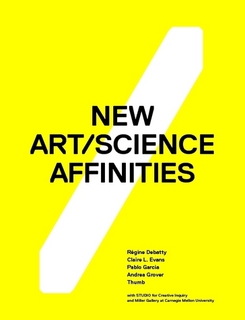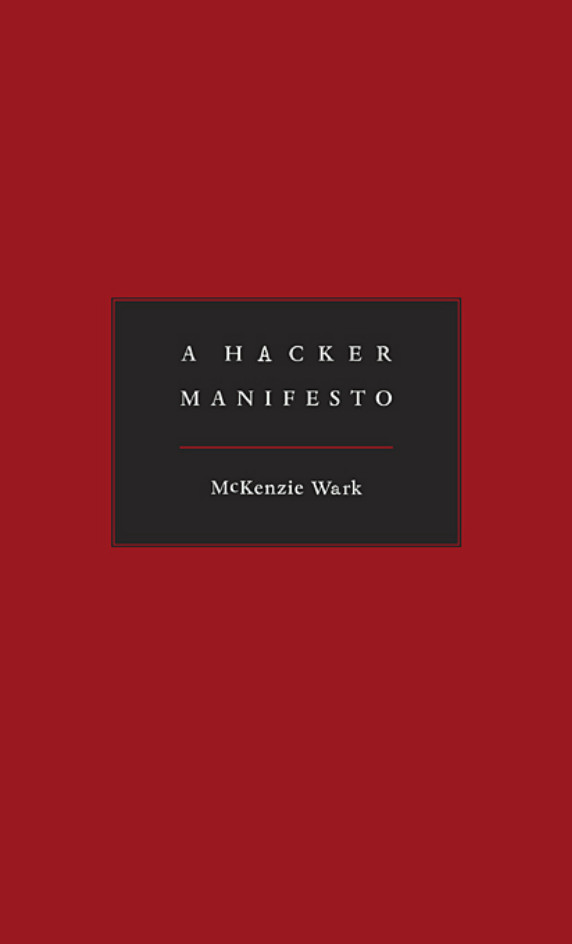Grover, Debatty, Evans, Garcia, Thumb: New Art/Science Affinites (2011)
Filed under sprint book | Tags: · art, bio art, biotechnology, hacking, maker culture, media art, programming, science, subversion, technology

The Miller Gallery at Carnegie Mellon University and the STUDIO for Creative Inquiry have co-published “New Art/Science Affinities,” a 190-page book on contemporary artists that was written and designed in one week by four authors (Andrea Grover, Régine Debatty, Claire Evans and Pablo Garcia) and two designers (Luke Bulman and Jessica Young of Thumb).
“New Art/Science Affinities,” which focuses on artists working at the intersection of art, science and technology, was produced by a collaborative authoring process known as a “book sprint.” Derived from “code sprinting,” a method in which software developers gather in a single room to work intensely on an open source project for a certain period of time, the term book sprint describes the quick, collective writing of a topical book.
The book includes meditations, interviews, diagrams, letters and manifestos on maker culture, hacking, artist research, distributed creativity, and technological and speculative design. Chapters include Program Art or Be Programmed, Subvert! Citizen Science, Artists in White Coats and Latex Gloves, The Maker Moment and The Overview Effect.
Sixty international artists and art collaboratives are featured, including Agnes Meyer-Brandis, Atelier Van Lieshout, Brandon Ballengée, Free Art and Technology (F.A.T.), Rafael Lozano-Hemmer, The Institute for Figuring, Aaron Koblin, Machine Project, Openframeworks, C.E.B. Reas, Philip Ross, Tomás Saraceno, SymbioticA, Jer Thorp, and Marius Watz.
The authors collectively wrote and designed the book during seven, 10-14 hour-days in February 2011 at the STUDIO for Creative Inquiry. During their sessions they held conversations with CMU faculty, staff and students from the STUDIO, Miller Gallery, College of Fine Arts, Robotics Institute, Machine Learning Department and BXA Intercollege Degree Program.
“The book sprint method was adopted in order to understand this very moment in art, science and technology hybrid practices, and to mirror the ways Internet culture and networked communication have accelerated creative collaborations, expanded methodologies, and given artists greater agency to work fluidly across disciplines,” says lead author Andrea Grover.
The publication is part of Grover’s Andy Warhol Foundation for the Visual Arts Curatorial Research Fellowship at CMU’s STUDIO for Creative Inquiry and Miller Gallery. “Intimate Science,” an exhibition that will be the product of Grover’s research, will take place in early 2012 at the Miller Gallery.
Published by Miller Gallery at Carnegie Mellon University + CMU STUDIO for Creative Inquiry, October 2011
ISBN 0977205347
190 pages
Licensed under Creative Commons Attribution-NonCommercial-NoDerivs 3.0 License
commentary (We-Make-Money-Not-Art.com)
authors
Andrew O’Hagan: Julian Assange: The Unauthorised Autobiography (2011)
Filed under book | Tags: · activism, biography, computing, cypherpunk, diplomacy, hacking, internet, media activism, military, politics, war, wikileaks

“In December 2010, Julian Assange signed a contract with Canongate Books to write a book – part memoir, part manifesto – for publication the following year. At the time, Julian said: ‘I hope this book will become one of the unifying documents of our generation. In this highly personal work, I explain our global struggle to force a new relationship between the people and their governments.’
In the end, the work was to prove too personal.
Despite sitting for more than fifty hours of taped interviews discussing his life and the work of WikiLeaks with the writer he had enlisted to help him, Julian became increasingly troubled by the thought of publishing an autobiography. After reading the first draft of the book at the end of March, Julian declared: ‘All memoir is prostitution.’ In June 2011, with thirty-eight publishing houses around the world committed to releasing the book, Julian told us he wanted to cancel his contract.
We disagree with Julian’s assessment of the book. We believe it explains both the man and his work, underlining his commitment to the truth. Julian always claimed the book was well written; we agree, and this also encouraged us to make the book available to readers. And the contract? By the time Julian wanted to cancel the deal he had already used the advance money to settle his legal bills. So the contract still stands. We have decided to honour it – and to publish.
This book is the unauthorised first draft. It is passionate, provocative and opinionated – like its author. It fulfils the promise of the original proposal and we are proud to publish it.” (publisher)
Ghostwritten by Andrew O’Hagan
Publisher Canongate Books, September 2011
ISBN 085786386X, 9780857863867
352 pages
review (David Leigh, Guardian)
review (James Ball, New Statesman)
review (Economist)
PDF (MOBI; updated on 2012-8-5)
Comment (0)McKenzie Wark: A Hacker Manifesto (2004–) [EN, DE, FR, CR, ES]
Filed under book | Tags: · commons, copyright, floss, free software, gift economy, hacker ethic, hacking, intellectual property

“A double is haunting the world–the double of abstraction, the virtual reality of information, programming or poetry, math or music, curves or colorings upon which the fortunes of states and armies, companies and communities now depend. The bold aim of this book is to make manifest the origins, purpose, and interests of the emerging class responsible for making this new world–for producing the new concepts, new perceptions, and new sensations out of the stuff of raw data.
A Hacker Manifesto deftly defines the fraught territory between the ever more strident demands by drug and media companies for protection of their patents and copyrights and the pervasive popular culture of file sharing and pirating. This vexed ground, the realm of so-called “intellectual property,” gives rise to a whole new kind of class conflict, one that pits the creators of information–the hacker class of researchers and authors, artists and biologists, chemists and musicians, philosophers and programmers–against a possessing class who would monopolize what the hacker produces.
Drawing in equal measure on Guy Debord and Gilles Deleuze, A Hacker Manifesto offers a systematic restatement of Marxist thought for the age of cyberspace and globalization. In the widespread revolt against commodified information, McKenzie Wark sees a utopian promise, beyond the property form, and a new progressive class, the hacker class, who voice a shared interest in a new information commons.”
Publisher Harvard University Press, 2004
ISBN 0674015436, 9780674015432
208 pages
Interview with author: Melissa Gregg (LA Review of Books, 2014).
Reviews: Hua Hsu (Village Voice, 2004), Vince Carducci (PopMatters, 2005), Graham Meikle (Scan, 2005), Brent K. Jesiek (New Media & Society, 2006), A Hacker Manifesto at Twenty (e-flux special issue, 2024, PDF).
A Hacker Manifesto (English, 2004, updated on 2014-9-12)
Hacker-Manifest (German, trans. Dietmar Zimmer, 2005, added on 2018-7-13)
Un manifeste hacker (French, trans. Club Post-1984 Mary Shelley & Cie Hacker band, 2006, added on 2018-7-13)
Hakerski manifest (Croatian, trans. Tomislav Medak, 2006)
Un manifiesto hacker (Spanish, trans. Laura Manero, 2006, added on 2018-7-13)
Manifiesto hacker (Spanish, trans. of a shorter essay, undated, v4, added on 2014-3-6)

